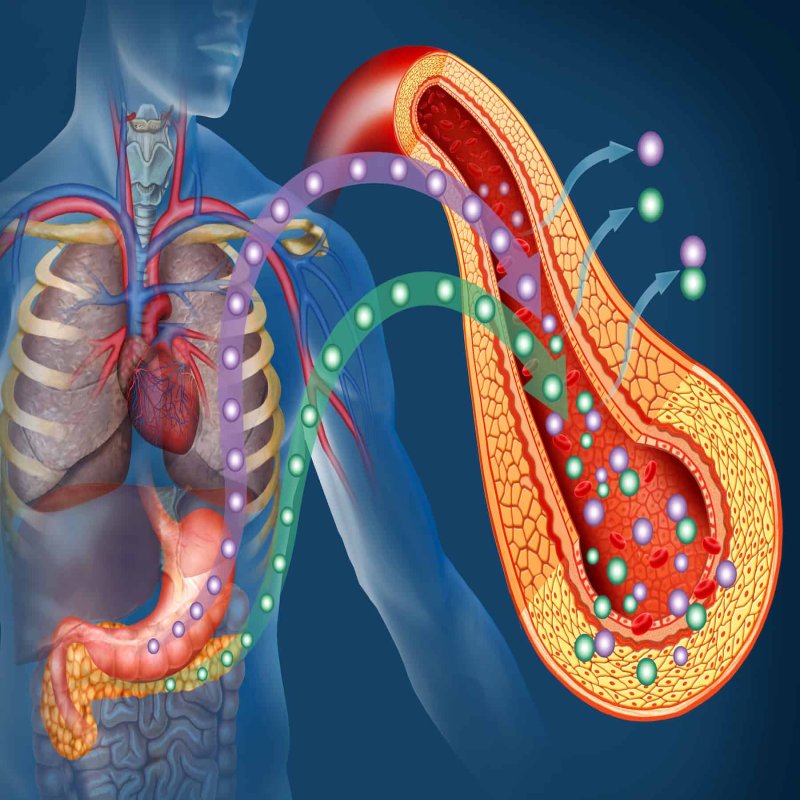
Our day-to-day life choices reflect our insulin levels and have a huge impact on our lives. This article will tell you all about insulin resistance and how it is linked to various metabolic syndromes.
What is Insulin Resistance?
Insulin is a hormone that is secreted by pancreatic islets and helps regulate glucose levels in your bloodstream by entering the cells in your muscle, fat, and liver, where it’s used for energy. We all know that glucose comes from the food that we eat. The liver, which is the largest organ in the human body, also makes glucose in times of need, such as when an individual is fasting. When blood glucose levels rise after a person eats, the pancreas releases insulin into the bloodstream. This particular process enables insulin to lower blood glucose levels to keep them in a normal range.

Insulin resistance is when your cells are not responding well to insulin and can’t process or take up the glucose from your blood. This results in your pancreas making more insulin and processing the glucose that is present in the bloodstream. As long as your pancreas can make an ample amount of insulin to overcome your cells in adequate response to the insulin present in the body, your blood sugar levels will stay in a healthy range.
What is a Metabolic Syndrome?
A metabolic syndrome is the organization of heart diseases or other risk factors that can increase your chance of developing any heart-related disease, stroke, or diabetes. This condition is also known by various other names, like syndrome X, insulin resistance syndrome, and dysmetabolic syndrome. According to a study conducted by the National Health Survey, more than one in five people has metabolic syndrome.
Who Typically has Metabolic Syndrome?
- People with obesity have increased fat in their abdomen and waist.
- Individuals with diabetes or have a genetic history of diabetes.
- Certain ethnic backgrounds also have a higher risk of developing metabolic syndrome.

The exact cause of metabolic syndrome is not yet discovered or known. There are many features of the metabolic syndrome, which is constantly associated with insulin resistance. As we discussed earlier, insulin resistance means that the body does not use insulin efficiently to manage the glucose levels in the bloodstream. A combination of genetic and lifestyle factors may help in managing excellent resistance. Factors like dietary habits, activity, and sleep also contribute to the management of insulin resistance in an individual.
What are the Symptoms of Metabolic Syndrome?
Usually, there are no immediate or visible physical symptoms of metabolic syndrome. Various medical issues associated with the metabolic syndrome develop over time and take time to show. If you are unsure if you have metabolic syndrome or another disorder, then you should seek help from your healthcare provider.
Due to the fast-paced nature of today’s world, physical inactivity or excess weight gain is one of the main underlying contributors to the development of various metabolic syndromes. It is important to keep in mind that exercising, eating healthy, and sleeping well contribute to the management of insulin resistance and can also reduce the symptoms of metabolic syndrome. Your doctor may have prescribed various medications to manage some aspects of your problem associated with metabolic syndrome; however, there are other ways that can also contribute to the management of the symptoms.
Eating healthy and having a gradual weight loss helps your body to restore proper secretion of insulin and can greatly reduce the chance of making this syndrome a more serious illness.
Exercise
We all know that having a good exercise routine and increased activity can improve your health. Aerobic exercises, such as walking briskly for 30 minutes, can promote weight loss. Your BP can also improve if you exercise daily.

Diet
If you maintain a diet that keeps carbohydrates away and includes more protein, then it can contribute to the reduction of symptoms and help you manage your insulin sensitivity and blood sugar levels.

Conclusion
This article gives you a proper explanation of how metabolic syndrome and insulin resistance are coordinated and important. Managing both of them can be very crucial for your health. Making subtle changes in your diet and lifestyle and exercising daily can reduce your symptoms by a sizeable percentage.


.png)


